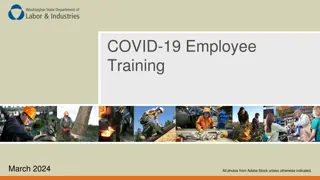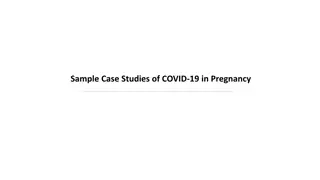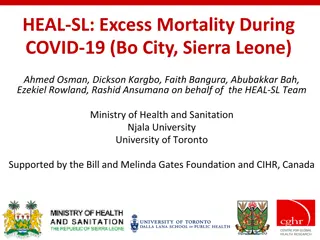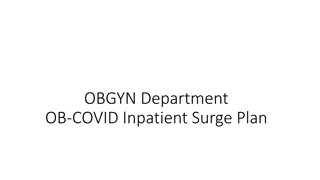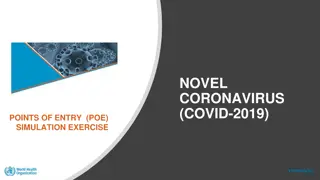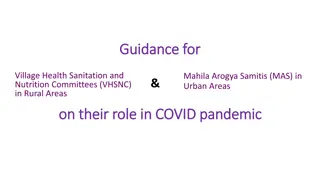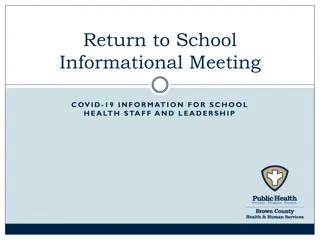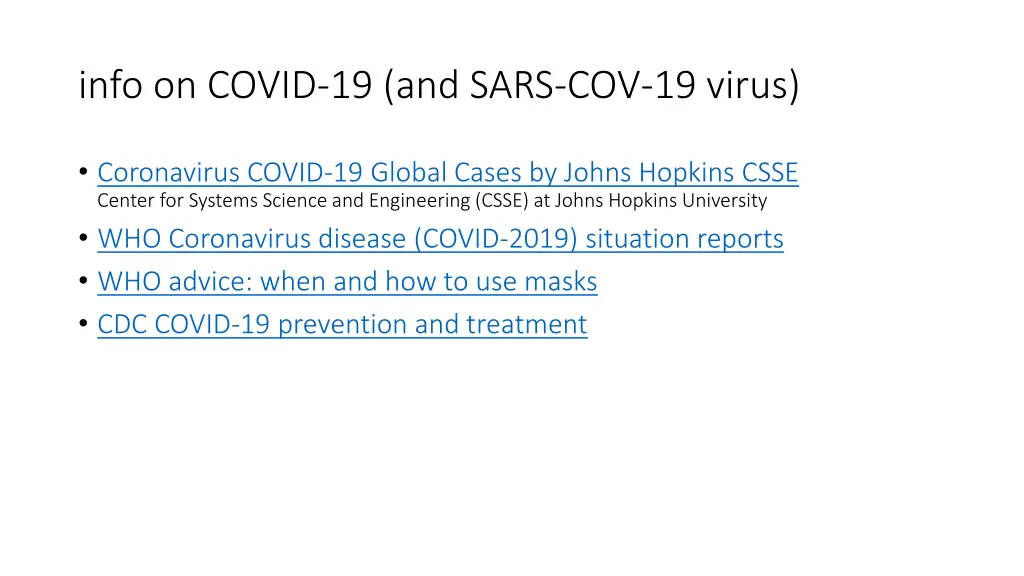
Understanding COVID-19: Global Impact, Life in Wuhan, and Political Repercussions
Explore information on COVID-19 and the SARS-CoV-2 virus, including global cases, life in Wuhan during the outbreak, political implications, and anti-Chinese sentiment. Learn about WHO and CDC guidelines, as well as societal responses to the pandemic.
Download Presentation

Please find below an Image/Link to download the presentation.
The content on the website is provided AS IS for your information and personal use only. It may not be sold, licensed, or shared on other websites without obtaining consent from the author. If you encounter any issues during the download, it is possible that the publisher has removed the file from their server.
You are allowed to download the files provided on this website for personal or commercial use, subject to the condition that they are used lawfully. All files are the property of their respective owners.
The content on the website is provided AS IS for your information and personal use only. It may not be sold, licensed, or shared on other websites without obtaining consent from the author.
E N D
Presentation Transcript
info on COVID-19 (and SARS-COV-19 virus) Coronavirus COVID-19 Global Cases by Johns Hopkins CSSE Center for Systems Science and Engineering (CSSE) at Johns Hopkins University WHO Coronavirus disease (COVID-2019) situation reports WHO advice: when and how to use masks CDC COVID-19 prevention and treatment
life in Wuhan Coronavirus Wuhan diary: Living alone in a city gone quiet Guo Jing, 30 January 2020 Panic has driven a wedge between people One Thousand Families : Intimate portraits of Chinese lives during coronavirus Thomas Bird, February 14, 2020 The One Thousand Families series, featuring portraits of Chinese families, tries to capture a sense of how people are faring during the COVID-19 epidemic. In the eyes of the masked subjects, we see boredom, resilience, anxiety, love, anger, and humor. The quarantine of a megacity: China s struggle over the coronavirus epidemic Ren Xuefie, February 4, 2020 While scientists question the effect of quarantining the entire city (and region), the measure does have great popular support.
political repercussions Rising Powers Politics Not Stopped by Coronavirus (Yet) Sigur Center for Asian Studies, George Washington University, February 2020 Coronavirus and the Panic Epidemic Ian Johnson, January 30, 2020 Instead of having an adult conversation with the population about the virus and putting in place reasonable policies that have been used effectively elsewhere, the Chinese state has gone into full lockdown mode. How Much Could a New Virus Damage Beijing s Legitimacy? Taisu Zhang, January 29, 2020 The more a government centralizes under social conditions like China s, the more it erodes the public s faith in the governance capacity of local officials, which further strengthens the short-term political benefits of centralization. Translation: Li Wenliang s Admonishment Notice China Digital Times, Feb 6, 2020
anti-Chinese sentiment Treating Yellow Peril: Resources to Address Coronavirus Racism Jason Oliver Chang As we continue to track the development of the coronavirus, racial fears and anxieties have become a dominant frame in which people evaluate the concerns over the recent coronavirus infection. This page is intended to gather textual and digital resources to provide easy access to material useful for teach-ins, talking points, and classroom teaching. Wuhan coronavirus? 2019 nCoV? Naming a new disease Mike Stobbe and the Associated Press, February 8, 2020 In 2015, the World Health Organization issued guidelines that discouraged the use of geographic locations (like Zika virus), animals (swine flu), or groups of people (Legionnaires disease) . With the guidelines, WHO was trying to bring an end to unnecessary stigma that could ostracize people and damage business. Racism in the Time of Coronavirus Sixth Tone, February 13, 2020 Ordinary racism against people of Asian descent existed before, which is now enhanced by the coronavirus. Fighting coronavirus fear with empathy: Lessons learned from how Africans got blamed for Ebola Kevin J.A. Thomas, February 6, 2020 In my view, our nation s response to Chinese immigrant communities should be based on actions informed by facts and not fear. Without such actions, we risk failure in our attempts to build the resilient communities needed to prevent the occurrence of a greater public health emergency within our borders.
anti-Chinese sentiment (2) Keep Calm, Wash Your Hands and Don t Be Racist David Inoue, February 7, 2020 Being Asian in the United States does NOT make one more likely to be a carrier of novel coronavirus. The new Yellow Peril? Jeremy Goldkorn, July 3, 2019 Today SupChina is launching the Sinophobia Tracker to provide an ongoing record of prejudicial and inflammatory statements from public figures in the United States and other signs of official targeting of ethnically Chinese people [Chinese students and scientists in the United States], rather than the Chinese government . Our creation of a Sinophobia Tracker does not imply that America, and other countries, have nothing to fear from China. Nor does it in any way imply that ethnic Chinese people in the U.S. are a homogeneous group . But the rhetoric from Washington, D.C., threatens to elide all those differences, and position ethnically Chinese people in the U.S. as a monolithic threat.
sensible perspectives How to Avoid the Coronavirus? Wash Your Hands, Elisabeth Rosenthal, January 28, 2020 Wash your hands frequently. [Stay home] when you are sick. Should you panic about the coronavirus from China? Here s what the experts say, Emily Baumgaertner, January 24, 2020 Don t panic unless you re paid to panic How Fear Distorts Our Thinking About the Coronavirus, David DeSteno, February 11, 2020 Such findings show that our emotions can bias our decisions in ways that don t accurately reflect the dangers around us Disease Burden of Influenza 35,520,883 symptomatic illnesses, 34,157 deaths (2018-2019 flu season) International overreaction to the coronavirus is more dangerous than the virus itself, Katherine Mason, January 31, 2020
if you want to help Donate Donate There is a fundraising effort, started by three NYU Shanghai students, called Light a Lantern for Wuhan. It has raised $56K already for organizations helping in China. Here are the instructions: 1. Donate any sum to any organization of your choosing Platforms for USD Donations: GivingGlobal, Give2Asia Platforms for RMB Donations: One Foundation, Shanghai Charity Foundation 2. Send a screenshot of the donation to shanghai.wuhanrelief@nyu.edu or fill out the form at https://wuhanrelief.shanghai.nyu.edu/ 3. Promote - Tag your friends on social media and ask them to join Be mindful of the uneven impact of the crisis Be mindful of the uneven impact of the crisis Be aware of how crises such as this affect communities differently, especially minority or immigrant communities, which by geographic chance or by biased treatment are forced to bear the effects disproportionately. Fact check before sharing Fact check before sharing Before passing along sensational news about China or the crisis, take a moment to check the facts: Search the headline on Google, Factcheck.org, or Snopes.com. Take care of yourself and loved ones Take care of yourself and loved ones Follow expert advice: https://www.who.int/emergencies/diseases/novel-coronavirus-2019/advice-for-public Wash your hands. Protect others if you're sick: stay home, cover your coughs and sneezes, see a doctor for fever, cough and difficulty breathing. Stay clear of other coughs and sneezes, and act with compassion.


